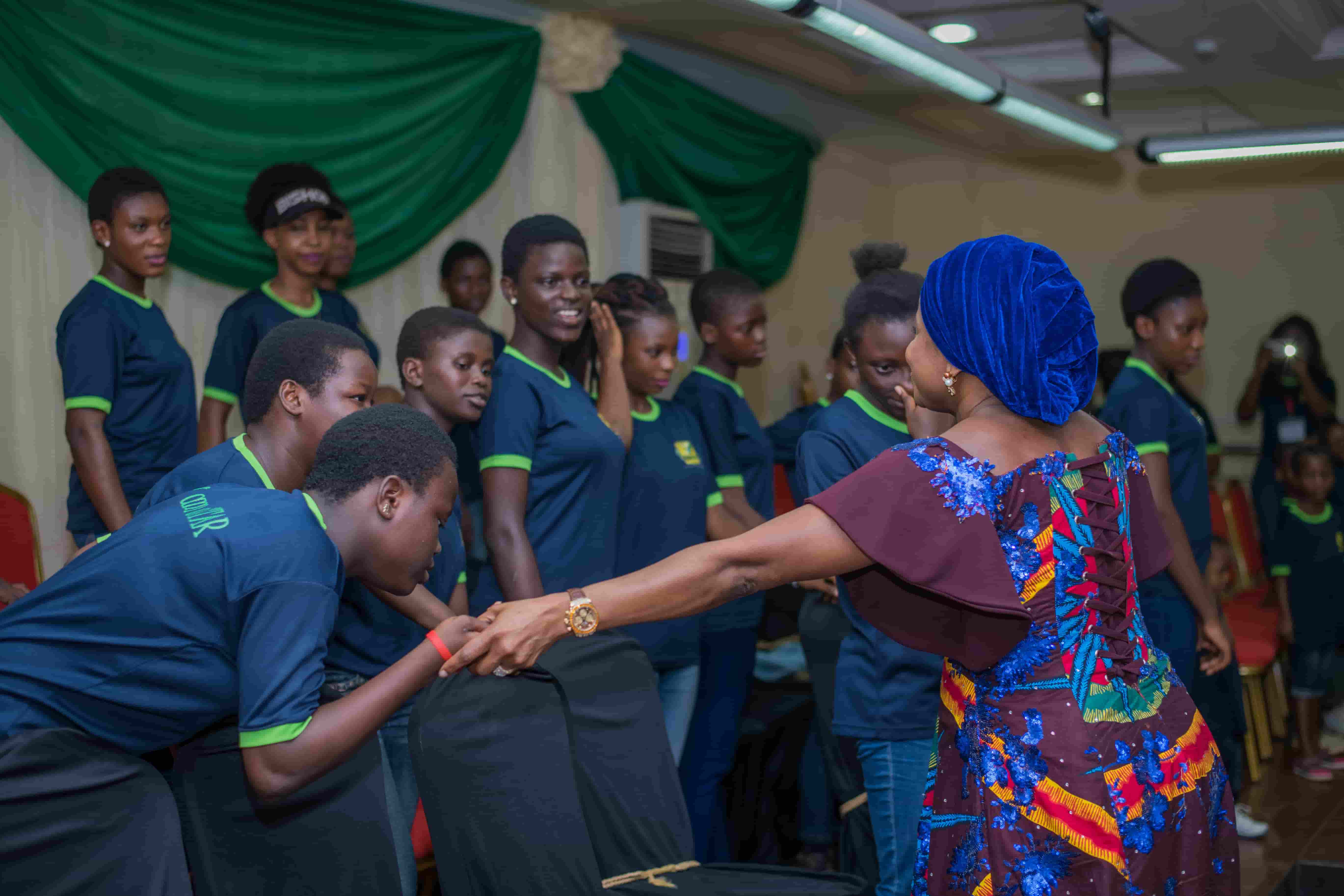
Offering Succor to the Homeless-Ijamido Children’s Home
Offering Succor to the Homeless-Ijamido Children’s Home
To mark her 50th birthday celebration after receiving an inspiration from God to impact lives, The Yinka Odumakinde Foundation (YEO) was birthed out of necessity in 2017 to identify, empower and transform the less privileged through access to scholarships and funding, thus transforming their lives and the society at large .Well known for her immense love for children, Mrs. Odumakinde launched the foundation by visiting the Ijamido Childrens Home same year where food items, school bags, computer laptops and lots of other needs as required by the home were provided. In this interview, the Administrative Head of the home, Eromosele Adetutu provides helpful perspectives on the complexity of the issues facing orphaned kids and the organizations trying to serve them.
Tell me a little about you and your family. How did you get involved with orphan care and with Ijamido Children’s Home?
My name is Eromosele Adetutu (Nee Willoughby), a product of Ijamido Children’s Home located at 147, Ilo Awela Road, Ota, Ogun State. I have been running a part of the administrative arm of the home for over 20 years. I coordinate education and welfare in the home.
What led to you choosing this career path?
I had a great experience as a growing child in the home. I witnessed the joy of transformation as I saw other children go from the level of hopelessness to become success stories and I knew I wanted to be involved in imparting lives positively too. Choosing this career path is my own way of giving back.
Do you find the job fulfilling? Despite the challenges of the job, I am fulfilled because I enjoy what I am doing.
At the last season of the Women Empowerment & Entrepreneurship Programme (WEEP), you were awarded a financial grant by YEO Foundation, please share more on this?
Yes, I was given a grant which I used to improve my business. It is also noteworthy to mention that during the WEEP 2018 seminar, I learnt valuable entrepreneurship lessons that I’ve deployed in building my business. I also learnt about creativity, making your own product, branding and so on which brought alive my vision for PEPEREKA ZOBO drink. It is becoming a huge success gradually.
How do you raise funds/ grants? Are there other investments the home has?
Funds and grants are raised for the home through friends and organizations that have the love of children at heart. The home is planning on investing in other projects such as farming as soon as other variants come into place. YEO Foundation recently acquired a fish pond project through the Ogun State Government for the home and even financed it. The project is still on and I believe it will be successful too, come harvest period.
You must have witnessed many children come and go while working at Ijamido’s children home, what has the experience been like?
Joy at having another member added to the family, sense of loss when withdrawn and fulfillment when they graduate and get married to become a nation.
About how many children have you served?
I have served and am still serving a lot of children; some of the older generations are married with children, thereby transforming me into a grandmother. Yoruba’s do not count their children as the adage goes.
What are the typical reasons for adopting children into the home?
The reasons for admitting children into our home is to provide succor to the deprived and home to the homeless, especially those who are at high risk for sexual and economic exploitation. Colloquially, most people think of an orphan as a child whose mother and father have both died. For our purpose at Ijamido children’s Home, we define an orphan as “any child who has no parents who can or will care for them.” So, while we provide admission for children whose parents have both died, we also cater for abandoned children, motherless and fatherless babies and vulnerable children. We have a family support unit that provides care for children who have living parent(s) or relatives but have no access to shelter or education.
Is there any policy of reuniting children with their parents?
Most of the children in our care have been abandoned. So, for many children a reunion with a biological family may be impossible. However, where possible we facilitate continued contact with extended families.
What is the age at which the orphans are sent out of the Ijamido home?
The orphans in my home are not sent out at a particular age, but the children are brought up with a sense of responsibility for their selves and other siblings. Therefore, they strive in all ways to make it well in life to be independent and help their siblings in the home.
Does the home give out children for adoption, if No, why?
Our children are not given out for adoption. Over forty years ago, the late Chief (Mrs.) Irene Virginia Willoughby, the founder of Ijamido Children’s Home received a clear clarion call from God to give hope to the otherwise hopeless who were unjustly given a raw deal by a society that is not caring enough. She cared for more than five hundred abandoned children in her lifetime. Today, some of Mama’s children are happily married and doing well in their different human endeavors. Some have passed out of higher institutions and vocational schools. And many are still attending schools and looking forward to a brighter future.
How do the children feel about not being adopted?
Adoption is an individual opinion; I can only speak for myself, although I can assure you that for over twenty (20) years of being part of the administrative body in my home, none of the children ever expressed their intention of being adopted out. In Ijamido Children’s Home, I believe it is not too challenging for the orphans to adjust to the real world because from inception, the child relates with other people in the public, attend school and fellowship in church with other children in the community. They make their friends, build their own world and finally pick their spouses amongst the people they relate with.
No matter how much an orphanage may prepare its children, do you think it is very challenging for the orphans to adjust to the real world?
On our part, we strive to provide a real family for the children in our care. The children in our care develop stable, lifelong relationships with real brothers, sisters, parents and caregivers. They are provided with the kind of loving family environment they need to thrive. The abandoned children have other members of the home they relate with and the public also sees to their wellbeing as their family. The motherless or fatherless children are brought into the home by their parent or extended families who come visiting them as at when due. Our children attend local schools, seminars, listen to the media and have adapted to community life. They learn skills they’ll need to integrate into the larger society. We have strategies in place to transition the children into successful, independent adults.
How is the education level for the orphans? Can you give some comparisons from early years versus today?
We are committed to providing every child in our care with the education and training they need to succeed as independent adults. The education level for the orphans have improved over the years. We hire tutors to help them stay ahead in school. Today, we have scores of graduates and undergraduates unlike in the early years when such opportunities were rare. Thanks to donors like YEO Foundation.
Any known abuse amongst the children? If yes, what type of abuse?
As we have it in our usual family set ups, we experience our sibling rivalry too, despite being a bigger family. Nevertheless, we exist to provide a high-quality, family-style residential care for orphaned children at. Our top priority is the safety of our children. We work hard to foster real, respectful relationships between staff and children at our home, while also maintaining strict guidelines. We welcome family and friends, but we do not encourage unmediated “open door’ policy.
What do you think are the most important needs of a child who is orphaned? What services do you think the government should provide for orphaned foster children?
The most important need of a child who is orphaned is love and care which will eventually generate into other necessities. Free education, medical aids and other amenities can actually enhance the livelihood of the orphaned child/ren.
Tell us something you are particularly proud of in your social work career?
My pride in my career are the challenges of nursing an infant to adulthood, re- directing their path from wrong to right especially during their teen years and having to maintain being firm and impartial.
Orphans tend to build emotional bonds with volunteers. Are the visits from mission homes and volunteers helping?
Emotional attachment happens in every area of life. Our children bond with the volunteers and enjoy it while it last. Some keep up contacts with them but their leaving is not enough to affect them negatively. The visits from mission homes and volunteers help a lot.
What advice would you give for those who want to be involved in orphanages?
Caring for orphans is one of the noblest act of humanity anyone can indulge in. I would advise everyone to take orphan care as a priority and get involved. God is interested in poor and vulnerable children. There is a special blessing for those who give sacrificially to assist orphans. I would advise interested volunteers and donors to find out the needs of the home they are interested in serving, pray and seek direction from God when embarking on a cause. He knows it all. Take a personal inventory of your skills, your talents and spiritual gifts and determine which of these are most useful in meeting the needs of orphaned kids.

0 comment